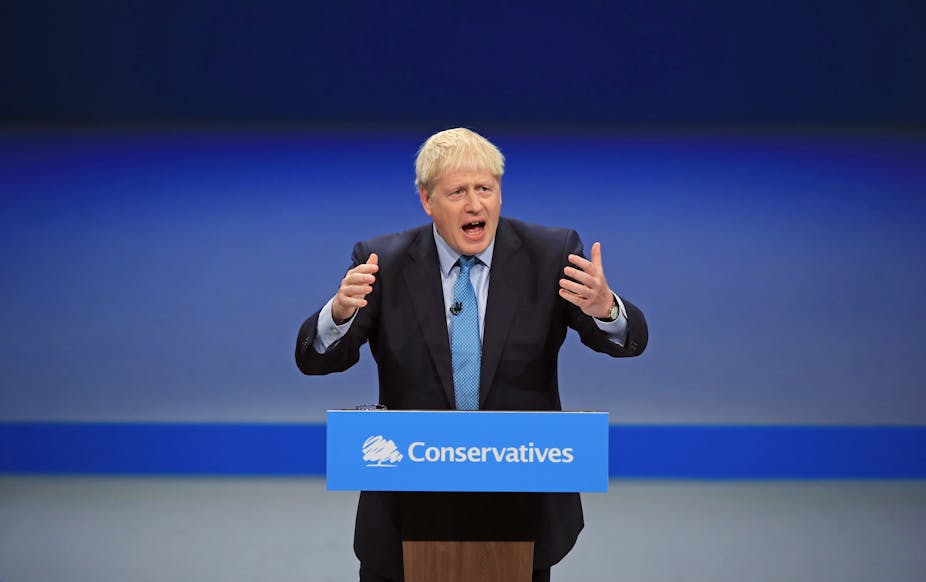Boris Johnson’s first conference speech as Conservative leader heralds the beginning of yet another crucial month as the British political classes grapple with the latest difficulties and divisions over Brexit. After the bitterness and acrimony that followed parliament’s return, the speech was classic Johnson: thin on detail, sometimes improvised, yet full of jokes. Ultimately it was a speech with one eye firmly on the general election that surely must follow soon.
Johnson has been rallying his party around the tagline “get Brexit done”. And while he skated over the topic of the Irish backstop, the bare bones of the government’s offer could be discerned.
The Johnson government has accepted that food, agricultural and manufactured goods in Northern Ireland will continue to be subject to EU rules as part of an all-Ireland economy. This arrangement will avoid the need for any checks or barriers on the Irish border. The rest of the UK would be free to diverge from these rules. Although Johnson did not mention it in his speech, there would have to be regulatory checks on any goods coming from Britain into Northern Ireland.
At the same time, Johnson was unequivocal in his speech that the British government would not propose customs checks at the Irish border, allowing it to argue that it was committed to abide by the Good Friday Agreement.
But if the UK is going to leave the EU’s single market and customs union (as Johnson wants) there will have to be checks and controls somewhere on the flow of trade, and Johnson’s speech revealed next to nothing on this vexed subject.
At one point, he made a vague reference to technology “improving all the time”. These words may confirm recent media reports that the government is about to suggest that a combination of technology, surveillance and trusted trader schemes can solve the Irish backstop issue. If true, these suggestions sound very similar to the “maximum facilitation scheme” proposed by Theresa May’s government (and rejected by the EU).
Getting Brexit done?
Johnson was clear that if the EU refused to engage with his proposals, the consequences would be a no-deal Brexit. Once again the commitment to get Britain out of the EU was reiterated. By “getting Brexit done”, the poison that had increasingly infected British political discourse could start to be drained and the country could begin to come together again.
And with Brexit resolved, Johnson argued, the country could look forward to a better future where it could “take back control” and develop policies that would appeal to all parts of the UK. In developing this “one nation” argument, Johnson cited the importance of his own personal beliefs (inherited from his mother, who, he revealed, voted Brexit) in the equal dignity and worth of every person.
Through a range of policy interventions (already announced by cabinet ministers in previous speeches to conference) the government would provide an equal opportunity for all to fulfil their ambitions. These included a programme of massive public spending aimed at upgrading Britain’s hospitals, schools, roads, railways, housing stock and broadband and plans to raise the minimum wage to £10.50 an hour by 2024. Johnson also repeated the pledge to recruit 20,000 police officers to crack down on crime and ensure the safety of communities.

Of course, these policy interventions have been developed to allow the Conservatives to outbid Labour, which has made investment in public services a key theme of its programme for government since 2015.
Will it work?
If Johnson can get a deal, he will be able to go to the country heralding the Conservatives as the party that delivered Brexit. But that ignores the fact that negotiations with Brussels over a new free trade area are likely to continue for the foreseeable future. The threat of the Brexit party would nevertheless be neutralised and the strategies of the opposition parties turned on their heads. The Liberal Democrats’ recent promise to revoke Article 50 if they get into government after the next election would need to be rethought.
Labour’s policy of renegotiating May’s withdrawal agreement and then holding a second referendum would also be out of date.
As things stand, the prospects for a deal with the EU do not look good. The Irish government has already rejected an earlier leaked version of the government’s proposals. If the UK walks away from the negotiations, Johnson would end up doing something that he said he would never do – accept an extension to Article 50. This U-turn would be a humiliation and a severe setback. At a subsequent election, the Conservatives could lose votes to a resurgent Brexit Party, leading to the prospect of another hung parliament.

